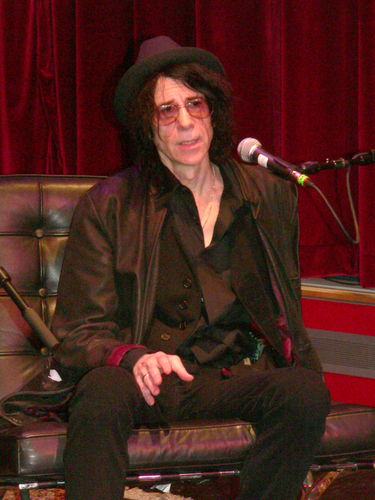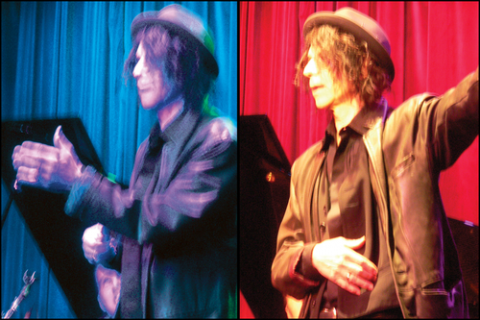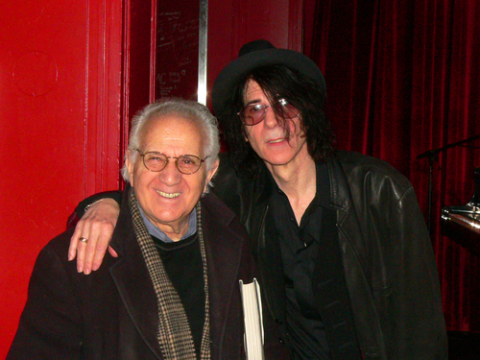Peter Wolf: The Historian/Rock Star

Peter Wolf

The Wolfa Goofa Mama Toofa in action

Berklee faculty pianist Ray Santisi (left) poses with Peter Wolf.
Peter Wolf was the lead singer of a rock band that released a slew of hit singles and albums, but he sure doesn't act like a rock star. "I don't consider myself a singer," he said during a Cafe 939 clinic last month. "Still don't. I don't consider myself a musician. Just a fan. I got involved in music not to meet girls, like most musicians, but to meet real musicians."
Before graduating from high school, the Bronx native was on his way. He had seen live performances by Otis Redding, Aretha Franklin, John Coltrane, and Thelonious Monk. While studying painting in art school in Chicago and working as a disc jockey at Boston's WBCN (his on-air moniker was the Wolfa Goofa Mama Toofa), Wolf immersed himself in one music scene after another, absorbing it all.
In Boston, he lived near the legendary Jazz Workshop, where he would rub shoulders with other musicians and listen to the greats. "Every night, someone else. Miles, Muddy, Trane, [Bob] Marley, [Van] Morrison." Before long, he was hanging out with the greats, having them visit his apartment, and interviewing them on his radio show.
While telling another story from the 1960s during the clinic, one of his heroes walked right into the room. It was longtime Berklee faculty pianist Ray Santisi, who played regularly at the Jazz Workshop and other Boston clubs, performing with jazz stars like Charlie Parker and Stan Getz.
"There's one of our great treasures right here," Wolf said after standing and waving toward Santisi. With the same reverent tone he had just been using to talk about Marvin Gaye and Charles Mingus, Wolf talked about admiring Santisi's work at the keyboard . . . and in the kitchen.
"This man can cook," Wolf said about Santisi and the cuisine he served up at Christmas parties in his Boston home.
In 1967, Wolf formed a blues band that eventually morphed into J. Geils. As the band grew in popularity with hits like "Must of Got Lost," "Love Stinks," and "Centerfold," Wolf became known as a dynamic frontman who could rev up crowds with his stories, radio DJ–inspired monologues, and, of course, passionate singing.
A student named Nick asked about Wolf's energetic style, and he had a quick answer. "It was like when I saw Chuck Berry playing at the Apollo. 'One for the money, two for the show.' I try to make it about the show."
Though Wolf maintains a lower profile today, he continues to write and record music with his own band. Albums such as Sleepless and Midnight Souvenirs have received critical acclaim.
Performing and recording is similar to working in the theater, Wolf added. "Great music is like a play. The screenplay is the song. Actors, like the musicians, bring it to life. You collaborate. A record is the same way. Great music is a collaborative effort that gets you to where you want to be."
About the state of the music industry, Wolf is less upbeat. "We are in a state of chaos as professional musicians. In the major labels, these guys have no clue because they know their day is gone. They've really turned on the musician. They just want the profit and not work for it. U2 didn't happen on the first record. Bruce [Springsteen], the Rolling Stones. Lord knows Aretha didn't happen on her first record.
"I hope I wake up from the idea of a place with no record stores, no sheet music. It breaks my heart to see guys playing all night and getting only 20 bucks," he said.
At the same time, Wolf says there will always be a market for music. "There's nothing more exciting than going into a club and seeing a band doing their thing with passion. The arts are never gonna die."
Between his own tours, Wolf is a fixture on the Boston music scene, occasionally showing up at Boston-area club shows featuring some of his heroes of today. Sometimes he does more than just listen. At a recent performance by the Giant Kings—a soul/country/blues band led by guitarist Duke Levine and featuring faculty member Kevin Barry on guitar—Wolf grabbed the mic and sang lead on two soul classics, as the crowd surged in a dance-fueled frenzy.
The Wolfa Goofa Mama Toofa was ruling the airwaves once again.
